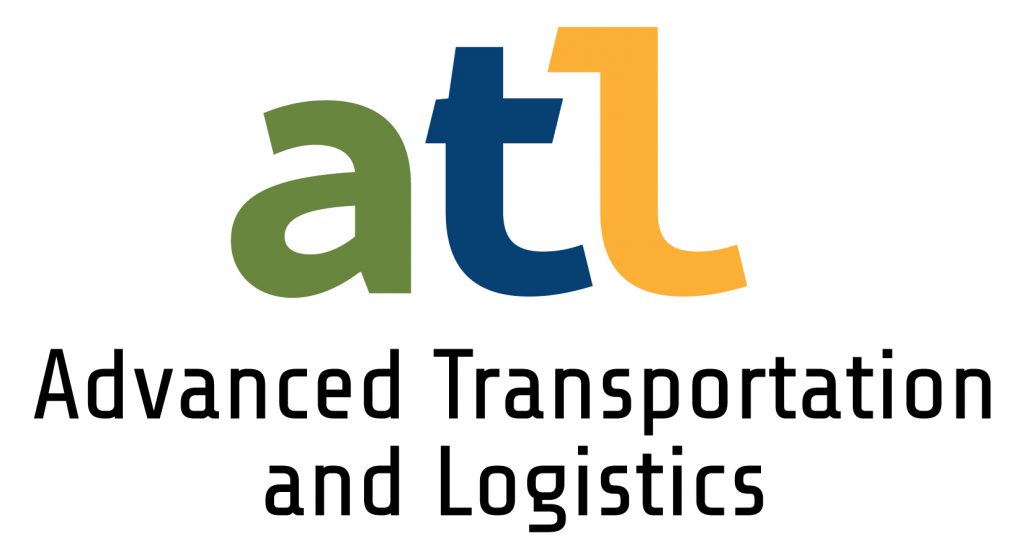By Craig Weckman, ATL Regional Director, North/Far North Region
At the beginning of the fall 2019 school year, Sacramento City College expanded its aviation classes to its Davis Center.
The department of Advanced Transportation Technology at both the Davis Center and McClellan currently offers courses and/or certificate programs in Aeronautics, Flight Technology, and Non-Destructive Testing. This department focuses on new and emerging transportation-related courses, as well as traditional training, which may lead directly to employment in local, state, and nationally recognized fields.
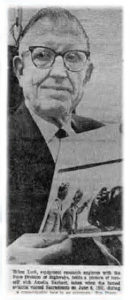
Hilton Lust holds picture of himself & Amelia Earhart
A Rich History in Aviation
Sacramento City College (SCC) has a rich history in Aviation. In fact, the Airframe and Powerplant program of Sacramento City College (SCC) is the nation’s oldest, continuous college A&P program.
Hilton Lusk, the founder of the Aeronautics program began the first outreach effort in 1930 at Sacramento High School when he helped to form an Aero Club so that students could explore aviation as a career. Although the SCC Aeronautics program began in 1930, the first Airframe and Powerplant degree was approved by the Civil Aviation Authority (CAA) in 1932 and Federal Aviation Administration (FAA) in 1958.
The program trained mechanics and pilots for World War II, the Korean War, the Vietnam War, and the Iraq Wars.
Although not a student at the college, Amelia Earhart visited the school and logged flight time using the SCC hangar facility and the program’s Lockheed 10 aircraft. SCC provided aircraft mechanic certifications for several classes of Rosie the Riveter and several World War II Ace pilots learned to fly in the SCC “Flying Panthers” Flight Club. Barracks were constructed on the SCC campus during WWII so that students could attend pilot training.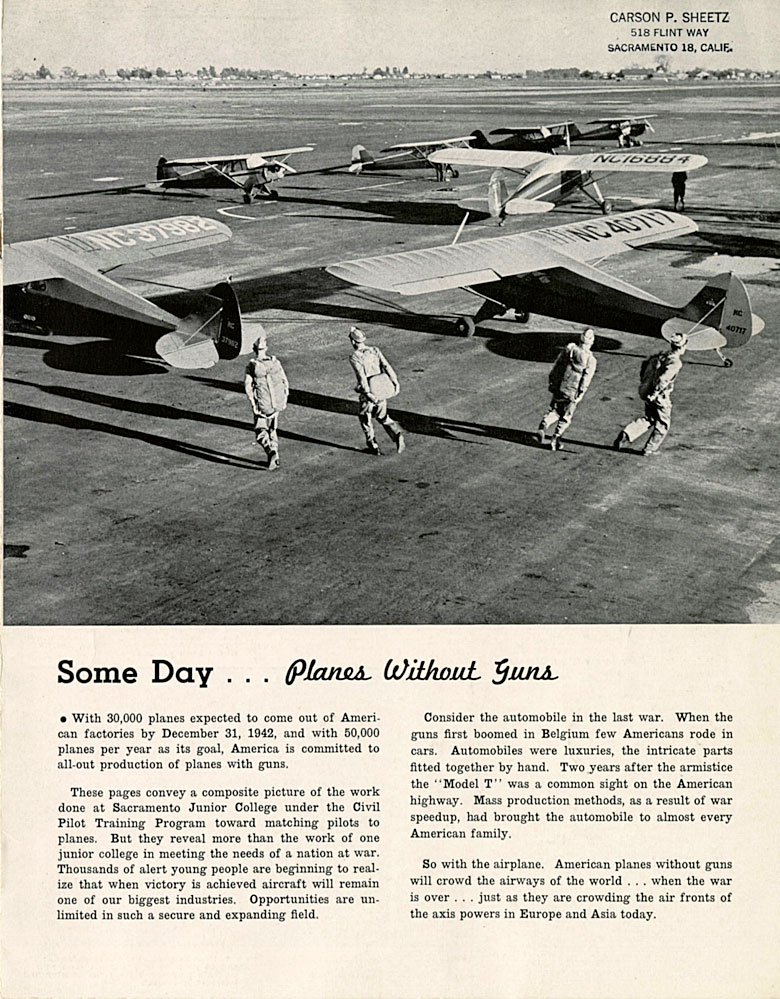
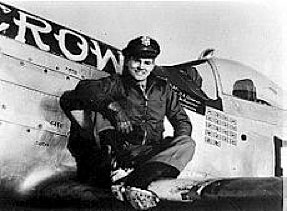 WWII triple ace Col. Clarence “Bud” Anderson (b. 1922), a former Sacramento College Aeronautics student, was honored on May 16 with a bronze statue of him dedicated at the airport in Auburn, CA. A replica of the P-51 Mustang that he flew in combat is mounted above his statue. A native of Newcastle, CA, Anderson now lives in Auburn. Col. Anderson actively flew planes including the P-51’s until his 90th birthday.
WWII triple ace Col. Clarence “Bud” Anderson (b. 1922), a former Sacramento College Aeronautics student, was honored on May 16 with a bronze statue of him dedicated at the airport in Auburn, CA. A replica of the P-51 Mustang that he flew in combat is mounted above his statue. A native of Newcastle, CA, Anderson now lives in Auburn. Col. Anderson actively flew planes including the P-51’s until his 90th birthday.
In May 2010, the Federal Aviation Administration approved the college as an Air Traffic-Collegiate Training Initiative institution, one of 37 institutions of higher education nationwide to receive such a designation. The Air Traffic Control A.S. Degree program began in Fall 2010.
In Spring of 2012, Federal Express retired several of its Boeing 727 aircraft. SCC Aeronautics program was selected to receive one of these aircraft, named “Gideon” to be used for instruction in the program.
Employment Outlook
Airframe and Powerplant Technicians are employed by major/regional airlines, certificated repair stations, fixed based operators, charter services, flight schools, corporate flight departments, agricultural aircraft operators, and helicopter operations, as well as government agencies and the military. Many experienced technicians opt to operate their own aviation businesses.
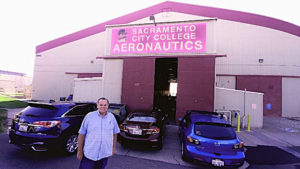
Phil Cypret, Professor of Aeronautics at Sacramento City College (SCC) at the McClellan Center
The Combined Airframe and Powerplant degree/certificate instruct the students to be able to demonstrate the knowledge and skills to inspect, maintain, repair, and modify airframe structures, and demonstrate the knowledge and skills to inspect, maintain, repair, and modify reciprocating and turbine engines.
The Flight Training Degree/Certificate teaches students to demonstrate the required knowledge and skills in order to qualify for the written portions of the Federal Aviation Administration examinations for pilot and instructor, perform navigational pre-flight planning, assemble and analyze terminal and en-route weather data, calculate departure, en-route, and arrival performance data, and assess risk factors to aircraft operations and apply the appropriate safety and communications protocols to mitigate the risks.
They also offer a Dispatch Certificate, in which students learn to perform the required duties of an Aircraft Dispatcher, as outlined by the Federal Aviation Administration, they demonstrate a readiness to take the oral and practical examinations for the Federal Aviation Administration’s aircraft dispatcher certificate, and apply concepts learned such as weather analysis, large aircraft systems, regulations, and human factors to practical Aircraft Dispatcher problems.
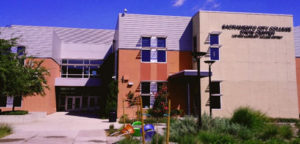 Sacramento City College maintains a Federal Aviation Administration approved two-year program organized to train students as airframe and powerplant maintenance technicians. The program is designed to meet the needs of students who desire technical training to qualify for the Federal Aviation tests.
Sacramento City College maintains a Federal Aviation Administration approved two-year program organized to train students as airframe and powerplant maintenance technicians. The program is designed to meet the needs of students who desire technical training to qualify for the Federal Aviation tests.
The Aeronautics program is governed by regulations established by the Federal Aviation Administration. This Federal Aviation Administration (FAA) approved program fulfills all the requirements under CFR 14, Federal Aviation Regulation part 147. Completion of this program will allow the graduate to test for the FAA Airframe Mechanic Certificate. Upon passing the appropriate Federal examinations, the graduate is certificated to work on aircraft as a technician and to supervise the work of others on such craft.
“Boeing estimates the global aviation industry will need 800,000 pilots over the next 20 years. A quarter of those new pilots will be needed for the U.S. market. Major airlines are hiring, and they’ve created special programs to recruit women, showing marked progress. Even so, at American Airlines, 4.8% of the pilot staff is female. At Delta, it’s 5%. It’s 7% at United. By comparison, at least 10% of pilots at the eight major airlines in India are female, according to a report by the BBC (12% in Australia and South Africa.).” (Wells, 2019)

